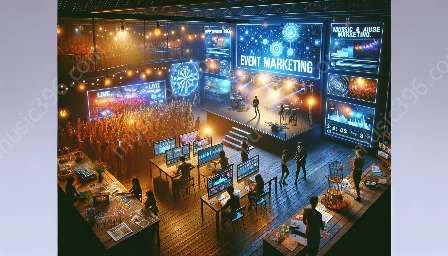Event marketing for music performances is an exciting and dynamic realm that requires careful consideration of ethical standards and responsibilities. From sponsorships and ticket sales to artist representation and community impact, there are crucial aspects to contemplate when crafting a marketing strategy for music events. In this comprehensive guide, we will delve into the ethical considerations in event marketing for performances, touching on the intersection of event marketing and music marketing.
Understanding Ethical Considerations in Event Marketing for Music Performances
Music performances hold a special place in the heart of both the artists and the audience. They serve as a platform for creative expression, cultural exchange, and community engagement. However, the marketing of music events involves a myriad of ethical considerations that can directly impact the artists, the audience, and the broader community. Let's explore some of the key ethical considerations in event marketing for music performances:
Sponsorship and Brand Partnerships
One of the fundamental aspects of event marketing is securing sponsorships and brand partnerships to support music performances. However, ethical dilemmas may arise when considering the compatibility of the sponsoring brand and the values of the music performance. Marketers must evaluate whether the brand aligns with the artistic integrity of the event and whether the association reflects positively on the artists and the audience. The transparency of the sponsorship agreements and the potential impact on the audience's experience are also pivotal ethical factors to weigh.
Ticket Sales and Pricing
The ethical considerations related to ticket sales and pricing are paramount in event marketing for music performances. Fair and transparent pricing practices, accessibility for diverse audiences, and the prevention of scalping or exploitation are central concerns. Additionally, the dissemination of accurate information about the event, the venue, and the ticketing process is crucial in maintaining trust and integrity within the community.
Artist Representation and Fair Compensation
Artists are at the core of music performances, and their representation and fair compensation are ethical imperatives in event marketing. Marketers and promoters must uphold ethical standards in their interactions with artists, ensuring transparent contracts, respectful negotiations, and equitable compensation. The promotion of diversity and inclusion in artist representation also plays a pivotal role in fostering an ethical and vibrant music industry.
Community Impact and Social Responsibility
Music performances have the power to influence and uplift communities, making community impact and social responsibility central ethical considerations in event marketing. Marketers must assess the potential impact of the event on the local community, including considerations such as noise levels, environmental sustainability, and economic benefits. Engaging in meaningful community partnerships, supporting local initiatives, and prioritizing the well-being of the community are ethical imperatives for event marketers.
Intersecting Event and Music Marketing Ethics
Event marketing for music performances intersects with music marketing in numerous ways, presenting unique ethical challenges and opportunities. The convergence of these two domains necessitates a holistic approach to ethical considerations. Let's examine how event marketing ethics and music marketing ethics intertwine:
Authenticity and Artistic Integrity
Both event marketing and music marketing revolve around the concept of authenticity and artistic integrity. When promoting music performances, marketers must ensure that their efforts align with the genuine essence of the artists and their creations. Balancing promotional objectives with the preservation of the artists' creative vision is a delicate ethical tightrope that requires thoughtful navigation.
Fan Engagement and Experience
Music marketing places a strong emphasis on cultivating meaningful fan engagement and delivering exceptional experiences. This focus resonates with event marketing, where the ethical responsibility lies in creating memorable and inclusive experiences for the audience. Marketers are tasked with upholding ethical standards in their engagement strategies, ensuring that promotional efforts enhance the audience's connection to the music and the artists without resorting to exploitative or manipulative tactics.
Cultural Representation and Diversity
Both event marketing and music marketing have a significant influence on cultural representation and diversity within the industry. Ethical event marketing emphasizes the promotion of diverse musical expressions and cultural representations, fostering an inclusive and equitable platform for artists and audiences. Collaboration between event marketers and music marketers can amplify these ethical pursuits, leading to a more diverse and enriching music landscape.
Transparency and Accountability
Transparency and accountability form the cornerstone of ethical marketing practices, whether in the context of event marketing or music marketing. Open communication, honesty in promotional messaging, and accountability for the impact of marketing campaigns are essential ethical tenets. By aligning their efforts with these principles, event and music marketers contribute to a trustworthy and ethically sound industry.
Conclusion
Event marketing for music performances presents a compelling blend of creative expression, business acumen, and ethical responsibility. By navigating the ethical considerations in event marketing, marketers can uphold the integrity of music performances, honor the artists, and enrich the audience's experiences. Embracing transparency, social responsibility, and the preservation of artistic integrity, event marketers can contribute to a thriving and ethically sound music industry.


























